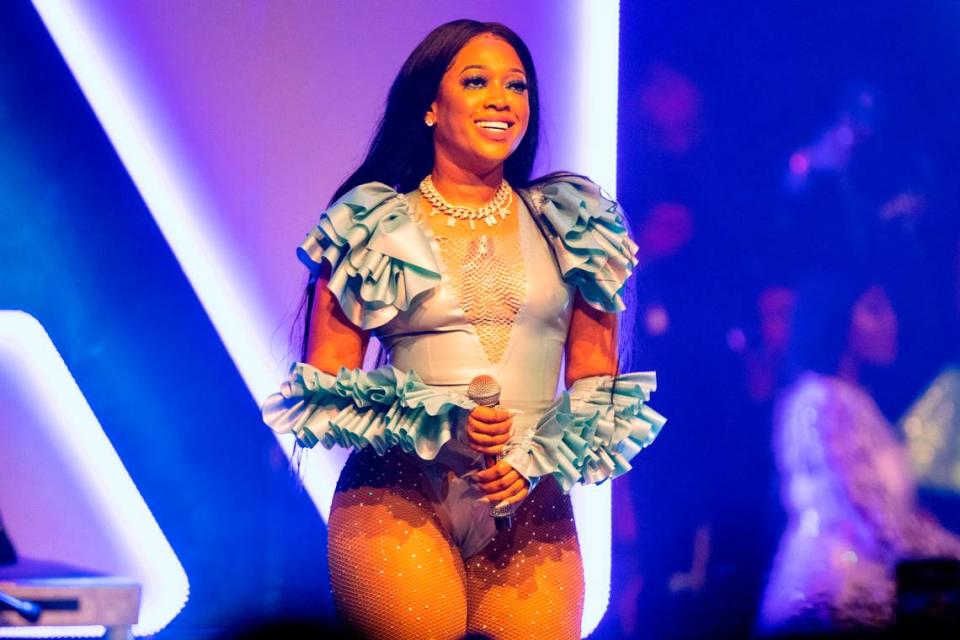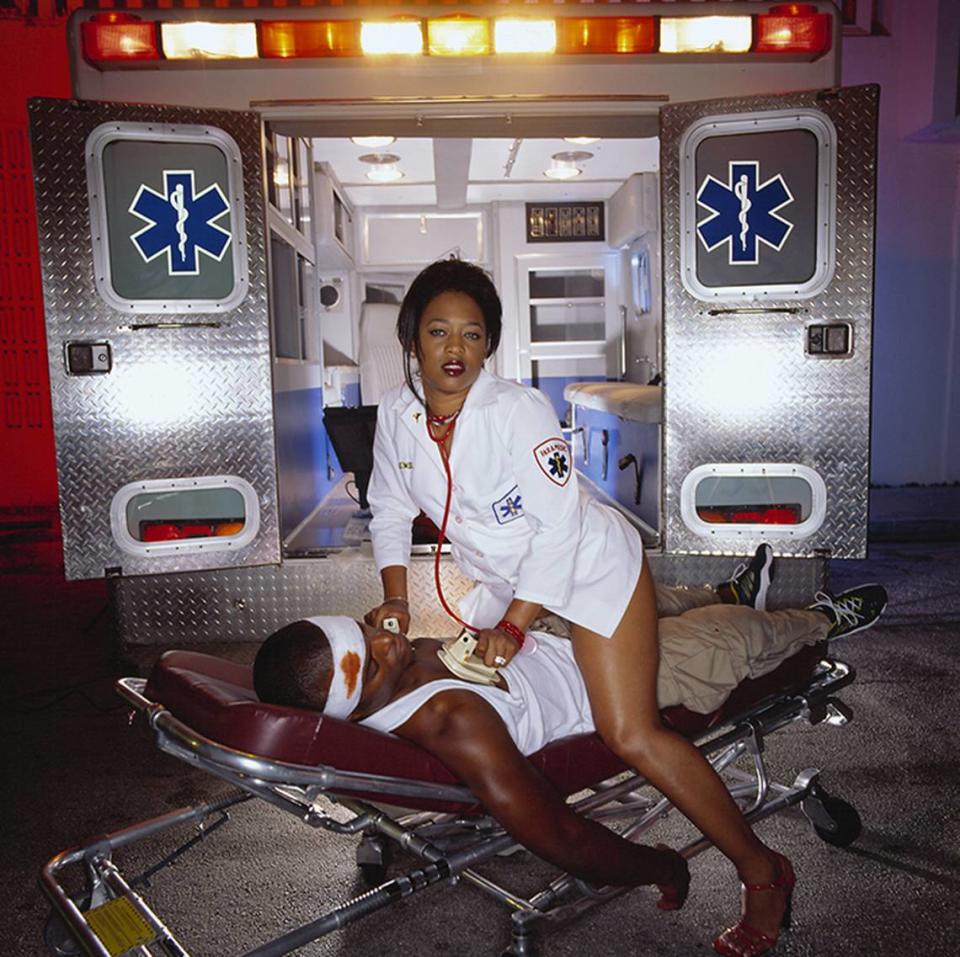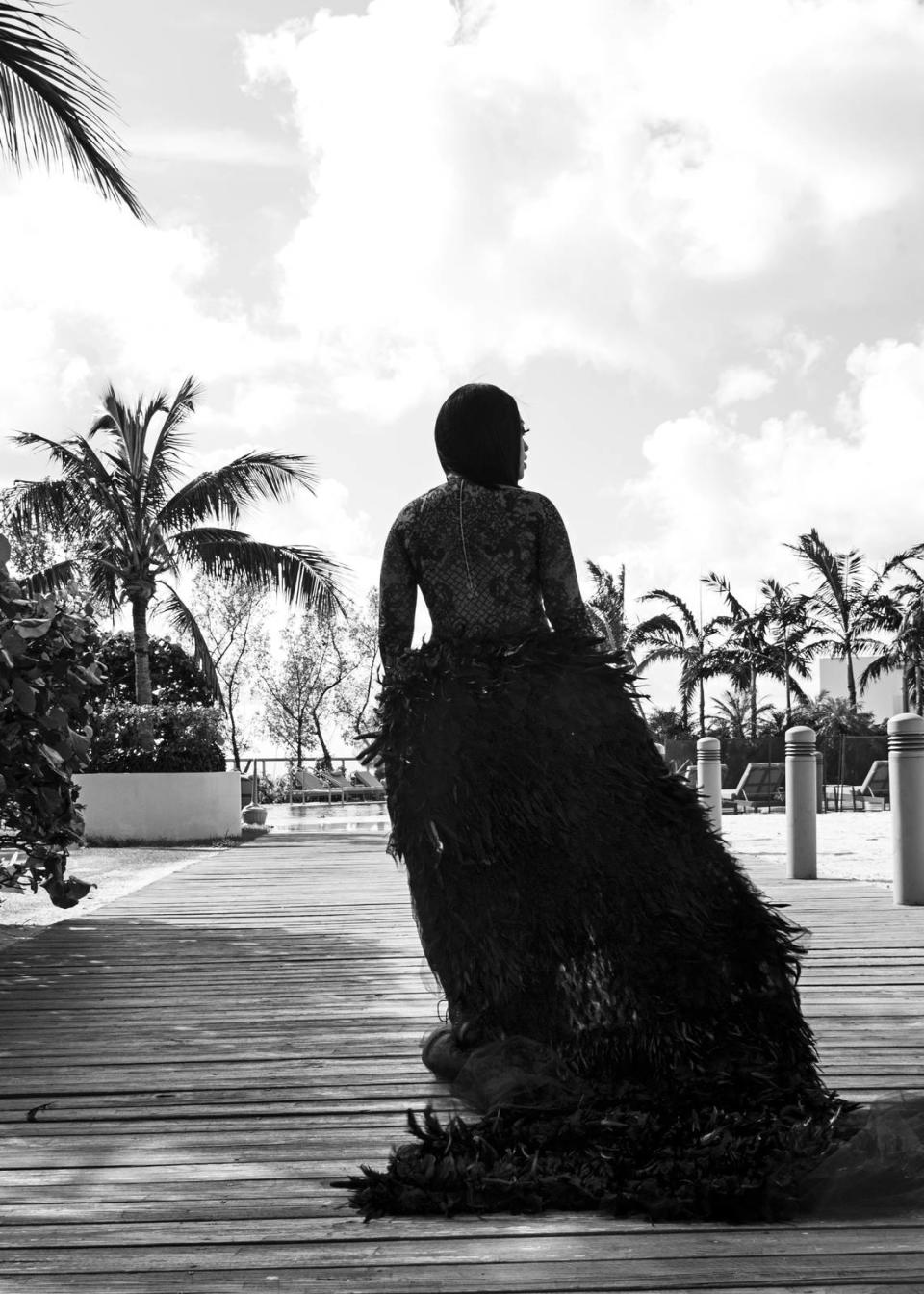‘You’re an icon.’ How Miami’s own Trina taught a generation of women to be the ‘baddest’
The “Diamond Princess” moniker fits Trina perfectly.
She’s used to nice things. It’s just that simple. Halfway through our interview the Liberty City-born artist casually mentions having limos take her to school. When asked why, Trina, whose mom owned a successful beauty shop, quips, “It was just one of those things... I grew up like that.”
Then there’s the royal treatment.
Backstage at a sold-out concert in Miami Beach in late October, you witness it firsthand. Trina might not be the headliner but she’s treated like the one everyone came to see. All the other artists on the bill — Melii, Kash Doll, Saweetie and Megan thee Stallion — stopped by her dressing room or made a point of exchanging kind words with the Diamond Princess. Even Lil Kim and DJ Khaled came through to show love.
“You’re an icon, you’re legendary, you are Miami,” Khaled bellows to Trina on stage during her performance.
How Trina shaped hip-hop
Being a woman in hip-hop is tough.
You can have the bars, the sound, yet still get dropped from a label because of your glam budget. Throw in the problematic “rap can only have one queen” narrative and you begin to understand why many female emcees disappeared during the late 2000s up until the mid-2010s.
As hip-hop finds itself in the midst of a cultural shift, Trina’s sustained relevance for more than two decades helped usher in this new era.
“The Nicki Minajs, the Megans, the Cardis — they really stand on the shoulders of Trina,” said Danyel Smith, former editor-in-chief of “Vibe” and “Billboard.”

Trina, born name Katrina Taylor, first burst onto the scene in 1998 with her eye-opening feature on Trick Daddy’s “Nann N*****.” Her verse, however, was a favor. Having just gotten her real estate license, she had zero plans of pursuing a career in music. Then came her first performance.
“I was just intrigued by how many women were saying every word of this record,” Trina recalled. “It was just the most shocking thing.”
Seeing the crowd’s reaction made her realize the Miami bass sound, popularized by the 2 Live Crew, didn’t have a female point of view.
Capturing that same energy fueled the recording of her debut album “Da Baddest B****” which was released March 21, 2000. Taking the cue from predecessors Lil Kim, Foxy Brown and Eve, she helped amplify the voice of women who had grown tired of hearing and seeing themselves portrayed as sexual conquests in hip-hop. And she did it in the most Miami way possible: brash, graphic and in your face.
“This was hood, this was letting it all out, this was pretty, this was fine, this was ratchet, this was everybody’s soon to be wife or baby mother,” Trick Daddy said in November of Trina’s early records. “[Hip-Hop] never had no girl like that.”

Trina’s high-pitched voice and provocative lyrics would become the battle cry of a generation of women wanting to embrace their sexuality. And her unabashed confidence in her shape made a statement before a term like body positivity was commonplace.
“When I did ‘Pull Over,’ it was about ass — girls with a big butt,” Trina explained. “It’s like ‘Hey, here’s your body, you got it, own it.’ We can’t blame ourselves for how we’re shaped. That’s how we were born. Embrace it.”
Some would suggest that Trina’s music has contributed to the hypersexualization of women. While that thinking has some merit, hip-hop feminist Joan Morgan contends black woman’s sexuality has been demonized for years.
“Our sexuality is often written about in a way that is historically problematized for obvious reasons,” Morgan said in 2012 during a discussion with Duke professor Mark Anthony Neal. “But what we’re less good at and have been less successful at is actually developing a language for pleasure and to assert the right to pleasure.”
Trina’s music, in a sense, does just that. She demands satisfaction in a society that has restricted women’s bodily autonomy.
“I’m very honest and open about my sexuality, being sensuous, being powerful as a woman,” Trina said, later adding, “I’m not the only person who believes in my side because as you can see, there’s a cult of woman that feel like they’re the baddest chick, that have [developed] off of the music I make, that have gravitated to the music I’ve made.”
Trina always shows love
Trina’s beef record is spotless.
She never got into messy spats with other femcees. She never let jealousy or hip-hop’s inherent competitiveness dictate her moves. And, most importantly, she never let those limo rides get to her head.
So when she speaks of the current crop of femcees, her face lights up like a proud auntie.
“I love all the new girls,” Trina said, flashing a smile. “I’m so obsessed with all the new girls because I love to see me in them.”

This emphasis on solidarity has already trickled down. When Trina started her own label Rockstarr Music Group in 2015, it was something she stressed to one her first artists, Nia Amber.
“Hearing that from her really just stamped it because [you] don’t really see this in the music industry,” Amber said.
This came as no surprise to Trick.
“In Miami,” Trick said, “we show everybody love.”
Trina’s success isn’t measured in accolades
Longevity isn’t easy in hip-hop. There’s always someone younger. There’s always someone whose record sells more.
Trina, however, has reached veteran status. She might not have enjoyed the commercial success of a Lil Kim or Foxy Brown, but there’s no denying her place as one of the female trailblazers of Southern hip-hop.
Platinum plaques and Grammys are cool but what Trina did, particularly for black and brown women, was invaluable
“When I came up with [”Da Baddest” title], I meant it as a sense of strength. Like you can conquer anything. You’re a woman. Women are undeniably the most beautiful creatures.”

